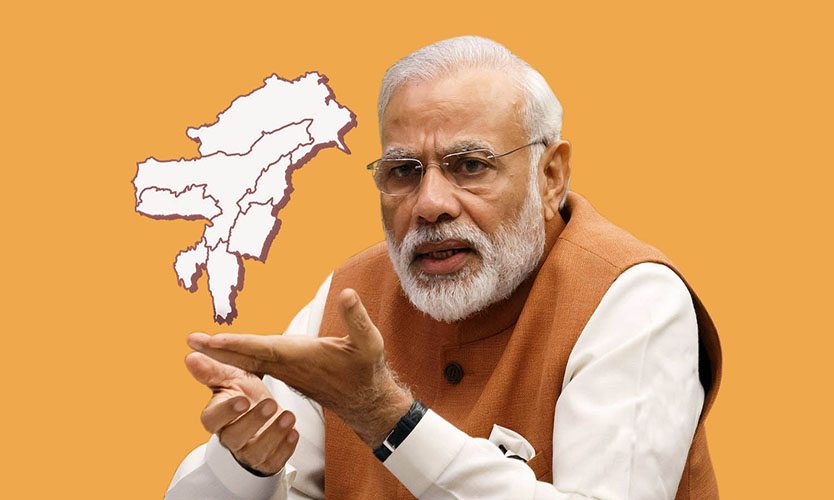One of the main internal security challenges India has faced for years is the insurgency in Northeast. The region has been plagued by insurgency led violence. The task of dealing with the insurgents was made tougher due to the fact that these groups sought refuge in Myanmar after conducting attacks in India. The governments of the past had a myopic vision towards solving the issue and they lacked the courage to take the insurgency head-on. However, the situation changed after Modi government came to power. In 2015, insurgents groups attacked an army convoy resulting in the death of 18 soldiers. In response, the Modi government authorized a cross-border strike on the terror camps and the army inflicted heavy casualties. This was a direct message to the insurgent groups that there is no such thing as ‘safe haven’ if they carry out attack against India.
The recent surgical strikes along the Myanmar border have been the latest in this area denial strategy. The massive crackdown destroyed several terror camps. India and Myanmar conducted joint operations from February 17 and March 2 to thwart the threats anticipated by Rohingya insurgent groups- Arakan Army and Naga terror group NSCN(K). Arakan Army is an insurgent group reportedly being raised by the Kachin Independence Army, which is designated as a terrorist group by Myanmar. It is a part of the coalition of insurgent groups called the Northern Alliance which is said to be supported by China. Whereas, NSCN (K) is Nationalist Socialist Council of Nagaland-Khaplang (NSCN-K) and a designated terror group in India.
For years, the northeast has been plagued by insurgency. PM Modi has always prioritized bilateral relations with Myanmar to maintain security and defence relations between the two countries focusing primarily on border security and counter-terrorism. The first-ever India–Myanmar Bilateral Military Exercise (IMBAX-2017), took place over six days in November 2017, and focused on peacekeeping operations. India’s concerns over border security were emphasised in 2015 when the Indian Air Force had conducted air strikes along the Myanmar border destroying two Militant camps one each of NSCN (K) and KYKL.
India hosted Myanmar’s top general for a week-long visit in 2017, during which he met Prime Minister Modi. Maritime cooperation between the two countries has also gained importance, with the Indian and Myanmar navies conducting their first-ever bilateral naval exercise, IMNEX-18, in March in the Bay of Bengal. The Myanmar navy also participated in the multilateral naval exercise off the coast of the Andaman and Nicobar Islands in early March. In 2017, the two countries signed an agreement to enhance maritime security cooperation in areas such as humanitarian assistance. India is also developing Sittwe port in Myanmar’s Rakhine State and implementing the US$484m Kaladan transport project, which will connect Rakhine State with India’s northeastern state of Mizoram. The recent surgical strike on the insurgent groups was to secure the smooth functioning of the Kaladan project.
Earlier applicable in many parts of the Northeast, the controversial Armed Forces Special Powers Act (AFSPA) is now limited to Nagaland, Assam, Manipur and Arunachal Pradesh. The insurgency in most of the north eastern areas is under control. The Centre has been pursuing a policy of talks and negotiations with insurgent groups and encouraging them to abjure violence, lay down arms and seek solutions to their problems peacefully. In 2015, an agreement was signed between the Centre and the Naga groups after the latter agreed to give up its long-standing demand for sovereignty. The peace talks along with the surgical strikes have been successful to a great extent, minimizing the militant threat. The number of insurgency-related incidents there decreased from 484 in 2016 to 308 in 2017, the year which saw the lowest number of insurgency incidents since 1997. Similarly, casualties of security personnel declined from 17 in 2016 to 12 the following year, and civilian casualties from 48 (2016) to 37 (2017).
Overall, winning Myanmar’s defense co-operation was one of the key achievements of the government without which effective neutralization of insurgency would not have been possible. The Modi government has taken a holistic approach towards eliminating the terror bases. With the co-operation from Myanmar, insurgent groups have been denied a safe harbor along the border of the northeast. Thus, have successfully eliminated insurgency threats; internally strengthening India and Myanmar.
